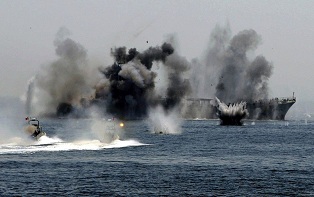Perils of Attacking Iran

From a 10-day Iranian war drill near the strategic oil route
that passes through the Strait of Hormuz...
In mid-April, Istanbul or Geneva will host nuclear talks with Iran. America, Britain, France, Russia, China and Germany will attend. Russian Foreign Secretary Sergei Lavrov calls them a "last chance" to avoid war.
Russian diplomats and independent observers expect it after talks designed to fail. Some believe launching it prevents or delays attacking Syria.
Al Quds al Arabi editor Abdel Bari Atwan told Russia Today he expects a package war against Iran, Syria and Hezbollah in Lebanon. Perhaps also against Hamas. At issue is when. Washington wants it after November's elections. Israel wants it sooner.
On March 21, former Mossad chief Meir Dagan said he believes Israel will know if Iran moves toward nuclear weapons production when, for example, it's enriching uranium to 90% purity.
He also said Israeli air power can inflict significant damage, but not without serious repercussions. Iran will counterattack. Hundreds of missiles will strike Israeli cities and strategic facilities, including nuclear ones. Hezbollah and perhaps Hamas will act supportively. So will America.
Middle East conflict may escalate beyond what's stoppable. The entire region will be embroiled. Netanyahu says Israel's prepared to strike Iran independently - "not within days, but not within years either." He also said "Israel has never left its fate in the hands of others, not even in the hands of our best friends."
On March 19, The New York Times headlined, "US War Game Sees Perils of Israeli Strike Against Iran," saying:
A "classified war simulation held this month" assessed significant repercussions of Israel attacking Iran. It said doing so assures wider regional war. America could get embroiled. Hundreds of US casualties would result.
US Central Command's war game tested communication and coordination between its Tampa, FL headquarters and Persian Gulf forces.
Not a dress rehearsal for war, officials said other outcomes were also possible. However, they raised fears that doing so might "be impossible" for America to avoid and with it serious consequences.
When exercises ended, Central Command head General James Mattis was especially troubled. He told aides that "an Israeli first strike would be likely to have dire consequences across the region and for United States forces there."
The Times called the war game an "Internal Look," similar to what preceded America's 2003 Iraq war. Hundreds of thousands died. Millions of refugees resulted. Vast devastation occurred. The cradle of civilization was destroyed. Nine years later, violence wracks Iraq daily. So does poverty, deprivation, contamination, and appalling human suffering.
With a population two and a half times larger, attacking Iran's nuclear facilities will affect millions catastrophically. If Tehran's retaliatory strikes inflict serious damage on or destroy Dimona and other Israeli nuclear sites, radiation will contaminate large parts of the region.
War games can't predict how nations will respond. Some US and Israeli officials think Iran doesn't want regional war so won't strike American targets, either Persian Gulf warships of Middle East bases. Others aren't so sure.
Iran knows Washington and Israel partner in regional wars, especially against common enemies. Ayatollah Ali Khamenei warns that Iran will retaliate if attacked, but won't escalate conflict. He said "(W)e will attack them at the same level as they attack us."
Given what Israel's likely to do, that's plenty. If America and Israeli forces attack jointly, it's perhaps no holds barred because holding back assures sure defeat.
Strategy means avoiding Iraq's fate. At issue isn't Tehran's nuclear facilities. It's replacing an independent regime with a pro-Western one. The same scenario's playing out in Syria. Tactics there involve externally-generated violence, followed by war if Assad survives.
If nuclear strikes don't dislodge Tehran's regime, expect full-scale war next, despite potentially enormous risks and hazards. They'll likely exceed all previous US engagements since WW II, especially if Syria's attacked and Lebanon's Hezbollah gets involved.
Imagine the potential consequences. Imagine leaders willing to risk them. The definition of insanity isn't just repeating the same mistakes and expecting different results. It's risking a likely catastrophic blunder and proceeding anyway.
History will judge Netanyahu and Obama, unless they create a scorched earth wasteland, left for future archaeologists to figure out what went wrong if any remain in future generations to try.
George Clemenceau once said wars are "a series of catastrophes that result in victory." He also called waging them "too serious a matter to entrust to military men." Given leaders like Obama, Netanyahu, and others like them, he should have included politicians.
He did say America's the only nation that went "from barbarism to degeneration without the usual interval of civilization."
America's permanent war policy proves him right. So does Israel's rage to wage them. Humanity's at risk if Iran and Syria are attacked. Yet both countries appear willing to risk it. If that's not insanity, what is?
___________________________________________________________________________________

Stephen Lendman: I was born in 1934 in Boston, MA. Raised in a modest middle class family, attended public schools, received a BA from Harvard University in 1956 and an MBA from the Wharton School at the University of PA in 1960 following 2 years of obligatory military service in the US Army. Spent the next 6 years as a marketing research analyst for several large US corporations before becoming part of a new small family business in 1967, remaining there until retiring at the end of 1999. Have since devoted my time and efforts to the progressive causes and organizations I support, all involved in working for a more humane and just world for all people everywhere, but especially for the most needy, disadvantaged and oppressed. My efforts since summer 2005 have included writing on a broad range of vital topics ranging from war and peace; social, economic and political equity for all; and justice for all the oppressed peoples of the world like the long-suffering people of Haiti and the Palestinians. Also co-hosting The Global Research News Hour, occasional public talks, and frequent appearances on radio and at times television. I also am a Research Associate of the Centre for Research on Globalization. I live in Chicago and can be reached at lendmanstephen@sbcglobal.net. Also visit my blog site sjlendman.blogspot.com and listen to The Lendman News Hour on RepublicBroadcasting.org Monday - Friday at 10AM US Central time for cutting-edge discussions with distinguished guests on world and national issues. All programs are archived for easy listening. My new book "How Wall Street Fleeces America: Privatized Banking, Government Collusion and Class War" can be ordered HERE.
___________________________________________________________________________________
URL: http://www.a-w-i-p.com/index.php/2012/03/22/perils-of-attacking-iran
























